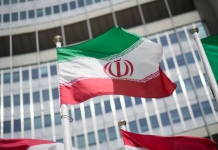DM Monitoring
WASHINGTON: US Secretary of State Michael Pompeo plans to hold talks with the foreign ministers of Armenia and Azerbaijan later this week, as he himself told reporters at a briefing on Wednesday. According to Pompeo, the consultations will take place on Friday, October 23.
He pointed out that “it’s a complicated situation on the ground.” “It’s a complicated diplomatic situation. Our view remains, as the view of nearly every European country, that the right path forward is to cease the conflict, tell them to de-escalate, that every country should stay out, provide no fuel for this conflict, no weapons systems, no support, and it is at that point that a diplomatic solution that would be acceptable to all can potentially be achieved,” Pompeo said.
“That’s what I will talk to them about on Friday and I’m anxious to hear from them what they’re seeing on the ground and how we might get closer to what we think is not only in the United States’ best interest but in each of their countries’ best interest as well,” the US secretary of state added.
Azerbaijan’s Foreign Ministry said earlier that the country’s top diplomat Jeyhun Bayramov would meet with Pompeo and the co-chairs of the OSCE Minsk Group in Washington on October 23. Politico said on Monday that Pompeo was expected to hold separate meetings with the foreign ministers of Armenia and Azerbaijan.
Renewed clashes between Azerbaijan and Armenia erupted on September 27, with intense battles raging in the disputed region of Nagorno-Karabakh. Azerbaijan and Armenia imposed martial law and launched mobilization efforts. Both parties to the conflict have reported casualties, among them civilians.
Moscow brokered a humanitarian ceasefire that took effect at noon local time on October 10 but was violated. Later, the foreign ministries of Armenia and Azerbaijan announced plans to declare another ceasefire at midnight on October 18, but the hostilities continue and the warring parties keep blaming each other for violating the truce.
The conflict over Nagorno-Karabakh, a disputed territory that had been part of Azerbaijan before the Soviet Union break-up, but primarily populated by ethnic Armenians, broke out in February 1988 after the Nagorno-Karabakh Autonomous Region announced its withdrawal from the Azerbaijan Soviet Socialist Republic.In 1992-1994, tensions boiled over and exploded into large-scale military action for control over the enclave and seven adjacent territories after Azerbaijan lost control of them. Talks on the Nagorno-Karabakh settlement have been ongoing since 1992 under the OSCE Minsk Group, led by its three co-chairs – Russia, France and the United States.


